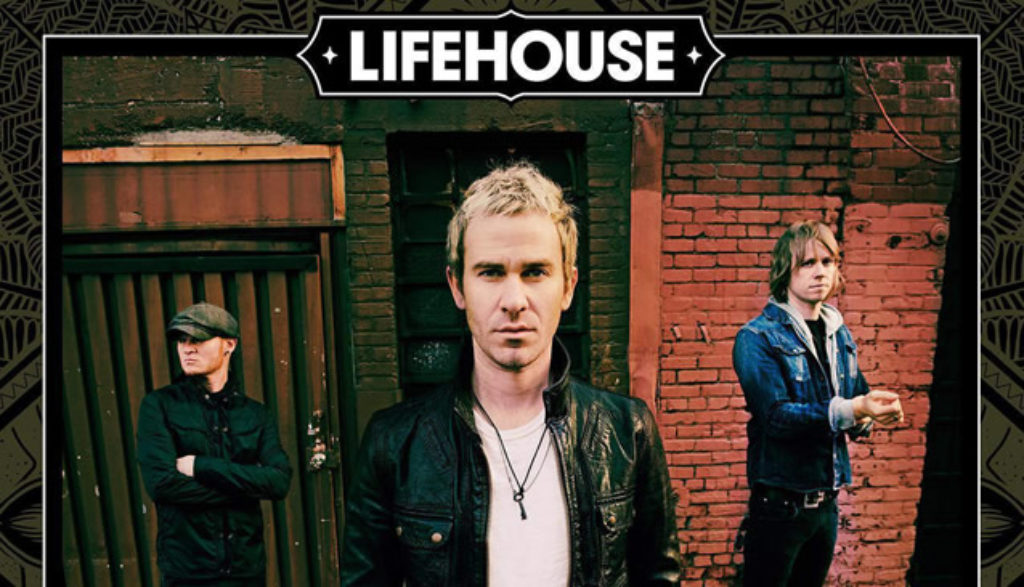
In 2012, frontman Jason Wade said of Lifehouse’s last effort, Almeria, “We just knew we had to go back to the drawing board and try something new. We felt like our sound needed to evolve and to change.”
It did. A bit. In my review, I noted that the album’s “songs blend Lifehouse’s signature acoustic and piano style with genres as diverse as the blues and country.”
Fast-forward a few years, and Wade says this about 2015’s Out of the Wasteland: “There was a kind of unlearning with this album. We wanted to retrace our steps back to the beginning and really find the innocence, that feeling of being 17-year-old kids who get excited about playing in the garage. … We ended up with something that’s an amalgamation of all of our influences, a collection of everything we’ve done for 15 years.”
So … is that a good thing or just a rehash? Well, when it comes to Lifehouse’s predominantly upbeat outlook on life throughout its musical career, it’s most definitely good.
The band’s determination to reinvent is front and center on album opener “Hurricane,” which tells us, “Turn the page/Turn the corner/ … We’re starting over/I don’t wanna live this way.” As the title suggests, this song is about standing strong when life’s storms threaten to separate us from those we love (“We brave the weather/Hurricane, couldn’t take you from me/I’m holding on tight, and I still believe/Ooh, yeah, it just gets better”). Later, Wade says of this relationship (perhaps his marriage to wife Braeden for 14 years?), “We made it through hell and back again.” “Central Park” pays more tender tribute to lasting love with, “As sure as the sun going down/I’ll always be around/ … I’m afraid of living here without you/My years were made to wrap my life around you/When I’m away, our souls are tied/ … I’ll always be yours.” Album closer “Hourglass” revisits these themes again, promising, “I said you’ll know/You’ll know when I give you everything/Everything I am/And we’ll go/We’ll go together hand in hand/Slipping through the hourglass home.”
Another tempest saturates “Flight” (“This storm has been raging”), which prompts Wade to ask for help (“And I need you now/There’s too many miles on my bones”) before lifting his chin and proclaiming, “No more running, no more hiding/No more hurting, no more crying/ … No more heartache, no more fighting/No more fears, only flying.” “Runaways” optimistically announces, “The future is ours untold/We are innocent and brave.”
“Firing Squad” presents a complex exploration of working through conflict. We hear, “And now you’re on the firing squad/I throw my hands up, I surrender/I don’t want to be a fraud/I don’t want to be the pretender/And I was like a lightning rod/I was always your defender/We were both right and wrong/I throw my hands up, I surrender.” “Wish” deals with someone rebelling against and fleeing from other people’s unmet expectations, with Wade saying to his struggling friend, “I wish the best of everything for you/I hope you know that I honestly do” before he asks, “How long can you run/Turn your back on everyone?” and concludes, “Just let me know/When you’re tired of being alone.” “Alien” then laments feeling like an isolated outsider (“I don’t wanna be alone/Always feeling like an alien”).
“Hurt This Way” is another layered song that relates the sad story of someone growing up with an abusive, alcoholic father, then challenges someone—perhaps the father, perhaps the son—to let go of pain and shame (“Shine it all, don’t be ashamed/Nothing ever stays the same/Why you want to hurt this way?”). In a correctional sort of way, someone is said to be “hell-bent on going back” to this destructive environment.
“Yesterday’s Son” finds a man differentiating himself from his parents (“I am not my mother or father”) before saying he’s strong, whole and not beholden to past hurts (“I am not yesterday’s son/I am not broken”) and reveling in the inviting road unfolding before him (“I’m a wide-open highway/With room to run”).
Though the entire song could be read as a cautionary tale (“I should have known better”), a man says of a dysfunctional relationship on “One for the Pain,” “I love you though you’re toxic/You’ve got a wicked hold on me/I’ve got a car that’s full of boxes/But I just can’t seem to leave.” Lyrics then hint at … something very bad happening (“So take one for the pain/Two to forget her/Three shots fired”).
A metaphorical lyric on “Runaways” can be heard as romanticizing running away (“As free as a couple of runaways”).
Jason Wade says he and his band did indeed recapture that “feeling of being 17-year-old kids who get excited about playing in the garage.” But it didn’t prevent Lifehouse’s latest from overflowing with the kind of mature perspective on life and love, conflict and perseverance that no 17-year-old could ever articulate.


After serving as an associate editor at NavPress’ Discipleship Journal and consulting editor for Current Thoughts and Trends, Adam now oversees the editing and publishing of Plugged In’s reviews as the site’s director. He and his wife, Jennifer, have three children. In their free time, the Holzes enjoy playing games, a variety of musical instruments, swimming and … watching movies.